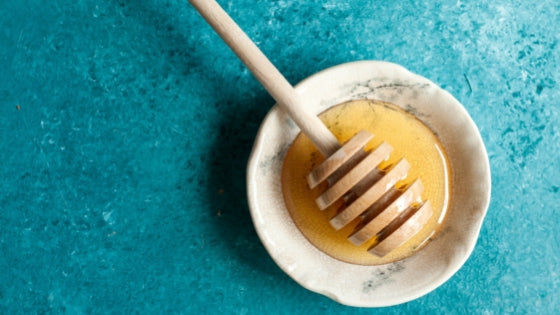
Cutting to the chase…
Can vegans eat honey? Do vegans eat honey? And is it whole food plant-based? The answer to these questions isn’t always cut and dry. We take a look at the difference between industrial beekeeping practices versus a more local approach, nutritional claims, and the environmental factors at play to suss out whether or not honey fits the bill for vegans and WFPB dieters.
Digging deeper
Honey is often promoted as a healthy sweetener and whole food friendly. But it’s also a controversial topic for vegan eaters. Why all the hullabaloo? Well, honey is an animal product. Technically.
Why the confusion? The term “animal products” isn’t as straightforward as you would think, particularly when it comes to honey bees and their nectar.
How honey fits into a plant-based diet is a heavily debated topic, so let’s lay out the facts and try to figure out an answer to the question “is honey vegan?”
Can vegans eat honey?
The world of bees and beekeepers is unfamiliar to most of us. What most of us do know, however, is that that bee population is on the decline. That’s a real problem, and not just for the bees. Bees are necessary for about a third of all food grown on Earth!
Humans are part of a natural ecosystem that depends heavily on bees as pollinators. Did you know around 80-95% of natural plant species depend on animal-mediated pollination? Crazy, right? And those plants are the foundation of almost every land-based food chain, so the loss of pollinators could have disastrous ramifications.
Why are the bees dying off?! Bee-killing pesticides used in industrial agriculture are a major factor. Climate change isn’t helping matters either; the Bee population is negatively impacted by the biodiversity loss associated with climate change.
Simply put, our pollinating friends are in danger. And the question of whether or not vegans who adopted this lifestyle because of their ecological values should eat honey is worth asking.
The honey industry and the environment
For some, the environmental benefits of a plant-based lifestyle is a major factor when deciding to go vegan. And honey production isn’t always eco-friendly. In some cases, farmed honey bees are outcompeting and endangering wild honey bee populations, and transporting honey (like many food products) long distances in trucks contributes to greenhouse gas emissions.
In the winter, bees need to eat their honey to survive which decreases production. Large industrial beekeeping operations often use cheap sugars to sustain the hives which aren’t any better for the bees than they are for you. Some industrial scale beekeepers kill off bee colonies altogether in the winter. Why? It is too expensive to maintain them.
But there are sustainable options. There are many fantastic beekeepers helping honey bee populations and producing honey for their local communities. Environmentally focused beekeepers know how to build and strengthen their bee colonies without harming native bee populations; they also sell their products locally.
Does honey offer nutritional benefits?
Ok, ok...but is honey healthy or not? A whole-food plant-based lifestyle is focused on eating nutritionally dense foods. Honey is not one of those foods. Honey has minimal nutritional value. The health claims associated with honey include medical benefits, such as helping with colds, coughs, and allergies. As far as basic nutrition goes, honey is lacking. Under the guidelines of a whole-food diet, that could make honey something to avoid.
Want a more No B.S. (Bad Stuff) way to sweeten your food? Try maple syrup, date syrup or date paste, or mashed bananas instead. Seriously, dates are amazing! Try our Sweet Treat Cookies and see for yourself.
So...is honey vegan?
That’s up to you, really.
- Honey is a natural sweetener and a healthier alternative to refined sugar.
- Industrial beekeeping can contribute to the decline in wild honey bee populations and create greenhouse gas emissions.
- Smaller and local operations are often more sustainable and ethical.
- Honey is produced by animals, so it’s not vegan.
- Honey isn’t nutritionally dense, which means it is not aligned with WFPB guidelines
- There are other WFPB ways to sweeten your treats (like the magical date!)
